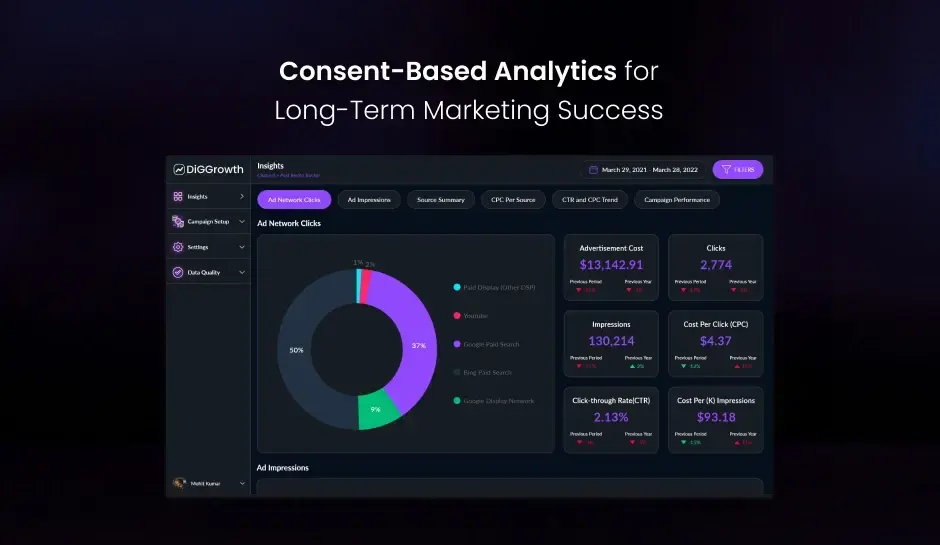
Essential Media Mix Modeling Tools for Effective Marketing Strategies
Effective marketing strategies rely on data-driven decisions. Media mix modeling (MMM) tools are instrumental in analyzing historical data to allocate resources efficiently across various channels. Read the blog to learn how these tools can transform your marketing approach and drive business growth.
Effective marketing strategies hinge on data-driven decisions. Media mix modeling (MMM) has emerged as a crucial tool for marketers seeking to optimize their advertising spend across various channels. By analyzing historical data and identifying the impact of different media channels on consumer behavior, MMM enables businesses to allocate resources more efficiently and maximize ROI.
The tools and software solutions that facilitate this complex analytical process are central to the success of MMM. From integrating diverse datasets to generating actionable insights, these tools play a pivotal role in shaping marketing strategies that resonate with target audiences.
This blog explores the realm of media mix modeling tools, providing an overview of their functionalities, key features, and the benefits they offer marketers. Whether new to MMM or looking to refine your current approach, understanding these tools can empower you to make informed decisions that drive business growth.
Foundations of Media Mix Modeling
Understanding the Marketing Mix: Channels and Tactics
Delving into the marketing mix necessitates grasping the various channels and tactics at a marketer’s disposal. These range from traditional outlets like television and print to digital platforms such as social media and search engines. Each channel possesses unique traits that influence consumer behavior, and it is the synergy of these that shapes an effective strategy.
The Data-Driven Approach to Media Mix
A meticulously curated media mix harnesses quantitative data to optimize marketing efforts. By scrutinizing metrics like customer engagement, conversion rates, and sales figures, marketers gain insight into the efficacy of each channel. This approach transcends guesswork, backing decisions with solid analytics.
Media Mix and the Multichannel Marketer
For the multichannel marketer, a well-conceived media mix maximizes reach and tailors messages for specific segments. Data aggregation from multiple touchpoints informs a nuanced understanding of customer journeys, allowing for dynamic adaptation of marketing strategies in real-time. This fluidity ensures sustained relevance and engagement across the entire spectrum of consumer interfaces.
Deciphering the Significance of Precision in Data for Media Mix Modeling
Successful media mix modeling is predicated on the caliber and integrity of the data employed. The consequences of using flawed data in the modeling process can lead to misleading ROI measurements and suboptimal marketing strategies. Precise data underpins powerful analytics, which in turn steer strategic decisions towards effective outcomes.
The Role of Big Data and Data Management
Data, burgeoning in volume, velocity, and variety, becomes invaluable in painting a comprehensive picture of marketing effectiveness. Proficient data management ensures this wealth of information is harnessed effectively, nurturing more accurate and granular insights from media mix models. This necessitates sophisticated tools that can handle complex datasets and deliver clarity on the influence of marketing tactics.
Enhancing Data Quality for Reliable Media Mix Insights
- Scrubbing data clean of inaccuracies sets the groundwork for dependable models.
- Validation protocols detect anomalies that could distort analytical outputs.
- Continuous data governance sustains data integrity over time, ensuring models adapt to evolving market dynamics.
Features of Media Mix Modeling Tools
At the heart of media mix modeling tools lies a suite of robust features designed to transform data into actionable insights. These features cater to marketers aiming to decipher the complexities of modern media environments and consumer behaviors.
Data Collection and Aggregation
High-quality media mix modeling tools facilitate collecting and aggregating vast data sets. Marketers can integrate information from multiple sources, including online and offline channels, to cultivate a comprehensive data landscape.
Predictive Analytics for Forecasting Sales Impact
Using advanced algorithms, these tools harness predictive analytics to forecast the sales impact of various marketing strategies. This foresight enables marketers to tailor their efforts for maximum efficacy.
ROI Measurement and Attribution Modeling
These models precisely measure return on investment (ROI) by attributing sales and conversions to specific marketing touches. Sophisticated attribution modeling distinguishes the value of each channel in a campaign’s success.
Budget Allocation and Spend Efficiency
Media mix modeling tools provide insights for optimizing budget allocation, ensuring that spending efficiency is maximized. Strategic investment in high-performing channels can lead to improved financial outcomes.
Cross-Channel Optimization for Maximum Performance
These tools specialize in cross-channel optimization, ensuring campaigns perform optimally across various media outlets. The holistic analysis clarifies how each channel contributes to overall campaign goals.
- Through data collection and aggregation, complex data from diverse touchpoints is synthesized into a single, coherent framework.
- Employing predictive analytics for forecasting illuminates potential future scenarios, informing strategic marketing decisions.
- ROI measurement and attribution modeling dissect campaign results to pinpoint the origin of success and inefficiencies.
- Insightful budget allocation translates into prudent financial planning and resource management within marketing operations.
- The pursuit of cross-channel optimization leads to a harmonious symphony of marketing channels, each playing its part to perfection.
Top Media Mix Modeling Tools
Choosing the right media mix modeling (MMM) tool is crucial for marketers aiming to optimize their advertising investments effectively. Here’s an informative overview of some leading tools in the market:
1. DiGGrowth

DiGGrowth offers advanced media mix modeling capabilities tailored to optimize campaigns and maximize ROI.
Key Features:
- Integration with multiple data sources for comprehensive analytics.
- Real-time performance tracking and forecasting.
- Customizable dashboards and reports for actionable insights.
Pros:
- Specialized in-depth analytics for effective media allocation and ROI optimization.
- User-friendly interface designed for marketers to navigate and utilize easily.
- Scalable solutions are adaptable to varying campaign complexities.
Cons:
- Pricing details may vary; potential consideration for smaller budget allocations.
- Depending on user familiarity with media mix modeling tools, initial training may be required for optimal use.
2. Google Marketing Mix Model
Google Marketing Mix Model, part of Google Analytics 360 Suite, is renowned for its integration capabilities and predictive analytics.
Key Features:
- Integration with Google Analytics for seamless data import and analysis
- Advanced attribution modeling to track and attribute conversions across channels
- Customizable reporting dashboards for real-time insights
- Predictive analytics for forecasting campaign outcomes and budget allocation
Pros:
- Strong integration with Google’s ecosystem, enhancing data accuracy and usability
- Powerful predictive capabilities that help in strategic planning and budgeting
- User-friendly interface suitable for marketers at various skill levels
Cons:
- Pricing can be high, particularly for smaller businesses or those without existing Google Analytics 360 licenses
- Requires familiarity with Google Analytics for optimal use
3. Analytic Partners

Analytic Partners offers a comprehensive suite of tools tailored for marketing effectiveness and media mix modeling.
Key Features:
- Multi-channel attribution modeling to assess the impact of each marketing channel
- Advanced statistical techniques for precise analysis and forecasting
- Real-time dashboards with customizable reporting features
- Scenario planning and optimization tools for strategic decision-making
Pros:
- Tailored solutions for different industries and business sizes
- Strong customer support and training programs to maximize tool utilization
- Scalable solutions that grow with business needs
Cons:
- Complexity may require specialized training for effective use
4. Nielsen

Nielsen is a prominent name in media measurement and offers robust media mix modeling solutions leveraging extensive consumer panel data.
Key Features:
- Integration with Nielsen’s comprehensive audience measurement data for accurate insights
- Cross-media measurement capabilities to evaluate performance across different channels
- Granular insights into audience demographics and behaviors
- Optimization tools to refine media planning strategies
Pros:
- Trusted industry leader with reliable data sources and benchmarks
- Comprehensive cross-channel analysis providing actionable insights
- Ability to benchmark performance against industry norms
Cons:
- Higher costs associated with premium data access and analytics services
- Learning curve for new users to fully harness the tool’s capabilities
5. Neustar

Neustar’s media mix modeling tools focus on delivering actionable insights for optimizing marketing spend and improving ROI.
Key Features:
- Data-driven attribution modeling to accurately attribute conversions to marketing efforts
- Real-time performance monitoring and reporting
- Integration capabilities with third-party data sources for enhanced analysis
Pros:
- Flexible pricing models catering to diverse business needs
- Actionable insights for optimizing campaign performance and resource allocation
Cons:
- Initial setup and integration may require technical expertise
- Advanced features may be more beneficial for larger organizations with complex marketing strategies
6. Marketing Evolution

Marketing Evolution offers an innovative platform for media mix modeling and cross-channel attribution using machine learning algorithms.
Key Features:
- Advanced machine learning algorithms for predictive analytics and optimization
- Real-time campaign tracking and performance evaluation across multiple channels
- ROI measurement and attribution modeling to quantify marketing impact
- Collaboration tools for seamless team integration and decision-making
Pros:
- Innovative approach to attribution modeling enhancing accuracy and strategic insights
- Scalable solutions designed for enterprise-level applications
- Detailed insights into the customer journey and campaign effectiveness
Cons:
- Higher costs may pose a barrier for smaller businesses or startups
- The complex interface may require training for new users to maximize tool benefits
Impact of Media Mix Tools on ROI Measurement
Media mix modeling tools transform nebulous marketing data into solid strategic insights. These powerful analytical instruments measure marketing effectiveness by attributing financial returns to specific advertising activities. Through precise calculations, businesses can discern which campaigns generate profits and which are underperforming.
Establishing a tangible connection between marketing initiatives and sales is a key function of these tools. Analysts leverage them to trace the sales impact back to individual marketing tactics. Such granularity empowers organizations to allocate resources more effectively, ensuring that each dollar spent contributes positively to the bottom line.
The right media mix can substantially amplify a company’s return on investment (ROI). Organizations use these tools to scrutinize past campaigns and optimize future budget distribution. By shifting funds away from lesser-performing channels into those with proven success, companies save money and enhance profitability.
- Media mix tools dissect campaign analytics, presenting actionable insights.
- Direct correlation of marketing efforts to sales uplift maximizes budget efficiency.
- Strategic budget reallocation based on these insights increases overall ROI.
By assessing diverse marketing channels, the redeployment of investments into more fruitful areas is streamlined. Continuous refinement of strategies leads to an evolving marketing plan that adapts to changes in consumer behavior and market conditions. Consequently, brands maintain a competitive edge in densely populated marketplaces where effective reach and conversion are always variable. By employing media mix modeling tools, businesses are not merely surviving in the turbulent seas of market competition; they’re proactively navigating toward greater profitability.
Revolutionize Your Strategy with Advanced Integrated Technologies in Media Mix Tools
Advancing technology continuously transforms the landscape of media mix modeling tools. Integrating state-of-the-art technologies such as machine learning (ML) and artificial intelligence (AI) has triggered a significant leap forward, streamlining complex marketing analytics processes.
The Intersection of Machine Learning and Artificial Intelligence
Machine learning algorithms dive deep into historical data to detect patterns and infer rules that govern consumer behaviors. Media mix modeling tools imbued with ML swiftly adapt to fluctuating market dynamics, making their output more refined and accurate. Similarly, AI in media mix modeling supports real-time decision-making by rapidly processing vast datasets to anticipate market trends.
How AI Enhances Predictive Analysis and Channel Optimization
Predictive analysis profits immensely from AI’s acute capacity to simulate potential future scenarios. By comparing countless permutations, AI supplies insights into the probable effectiveness of various media channels. This level of analysis is essential for optimizing channel performance and ensuring that each media investment contributes maximally to the overall marketing objectives.
Marketing Data Integration and Management Solutions
A crucial capability of modern media mix tools is their proficiency in combining disparate marketing data sources into a coherent, manageable platform. Efficient data integration and management supported by these advanced technologies allow marketers to access integrated insights effortlessly. Consequently, they can construct a more cohesive view of their marketing performances and make informed strategic decisions.
- Tools with advanced technological capabilities process complex datasets more efficiently, reducing time to insight.
- AI-powered optimization recommends budgetary adjustments to enhance spending efficiency across all channels.
- Robust data management solutions consolidate diverse information streams, enabling more concerted marketing analysis.
Whether through enhancing predictive accuracy, optimizing channel performance, or providing comprehensive data management, the advanced technological integration in media mix modeling tools equips professionals with unparalleled analytical power.
Real-World Impact of Media Mix Modeling Tools
Through the systematic application of media mix modeling tools, businesses have transformed their marketing strategies and achieved remarkable growth. By deconstructing the results and methodology of several industry leaders, actionable strategies emerge from the data, evidenced by significant growth in their respective markets.
Optimization and Growth Demonstrated by Top Brands
A multinational consumer goods company harnessed media mix modeling to redefine its marketing expenditures, resulting in a 25% increase in marketing efficiency. Leveraging historical data, it identified which marketing channels yielded the highest ROI and reallocated budgets accordingly. This shift enhanced its resource distribution and uplifted its bottom line.
In the fast-moving consumer goods sector, another enterprise utilized media mix modeling tools to measure the sales impact of digital versus traditional media. Findings revealed digital channels were underfunded, leading to a 15% budget reallocation towards digital. The decisive outcome was a surge in sales performance, attributable to a more fine-tuned media strategy.
Insights from Industry Leaders
- Digital streaming services have seen a surge in subscribers after applying media mix modeling to uncover efficient promotional channels. One service reported subscriber growth of 10% within a quarter after adjusting its channel strategy.
- A major retail brand utilized a media mix modeling tool to gauge the efficiency of holiday campaigns, leading to a refined marketing approach that increased seasonal sales by 20%.
- Automotive dealerships have tailored their marketing to focus on high-conversion media platforms, achieving a notable lift in customer inquiries and a stronger dealership presence in targeted regions.
Key Takeaways
- Media mix modeling tools provide deep insights into marketing effectiveness, enabling businesses to quantify the impact of each channel on key performance metrics.
- Implementing media mix modeling involves auditing data capabilities, selecting suitable tools, and integrating them gradually for optimal results.
- Incorporating machine learning and real-time algorithms enhances decision-making and adapts to dynamic digital environments.
- Ensuring your team is proficient in using these tools is crucial for maximizing their effectiveness and ROI.
- Choose tools that allow flexibility and scalability to adapt to evolving marketing trends and consumer behaviors.
Conclusion
Media mix modeling tools revolutionize how businesses strategize and allocate their marketing budgets. By leveraging these tools, companies can make data-driven decisions that optimize their marketing efforts and drive measurable results. It’s essential to select tools that align with your business goals, integrate seamlessly with your existing infrastructure, and empower your team through training and support.
Evaluate different media mix modeling tools based on their integration capabilities, customization options, user experiences, and vendor support. Choose a solution that meets your current needs and evolves with your business, ensuring long-term success in navigating the complex marketing landscape.
Ready to unlock the magic of MMM? Talk to Us!
Contact info@diggrowth.com to discuss how our expertise can help you implement the right media mix modeling tools for your business.
Ready to get started?
Increase your marketing ROI by 30% with custom dashboards & reports that present a clear picture of marketing effectiveness
Start Free Trial
Experience Premium Marketing Analytics At Budget-Friendly Pricing.

Learn how you can accurately measure return on marketing investment.
Additional Resources
Consent-Based Analytics for Long-Term Marketing Success
As marketers, we want our customers to perceive...
Read full post postDrip Campaign Mastery: 8 Tips to Nurture B2B Leads for Long-Term Success
Ever felt lost in the world of B2B...
Read full post postHow To Become An AI-Ready Organization
Remember the excitement around Google Lens or the...
Read full post postFAQ's
Media mix modeling (MMM) tools are software solutions that help businesses analyze the impact of various marketing channels on sales and other key metrics. They integrate data from different sources, use statistical techniques to identify patterns and provide actionable insights to optimize marketing spend.
Deeper insights: Gain a more comprehensive understanding of marketing effectiveness than traditional guesswork. Quantified impact: Measure the contribution of each channel to sales and other KPIs. Optimized budgets: Allocate resources more efficiently by identifying high-performing channels. Data-driven decisions: Make strategic choices based on real data and insights. Adaptability: Respond to evolving market dynamics and consumer behaviors with real-time data analysis.
Unlike simple attribution models, media mix modeling considers the synergistic effects of multiple channels. It provides a holistic view of marketing impact across different media. It uses advanced statistical methods to uncover hidden patterns and causal relationships between marketing activities and outcomes.
MMM tools help establish a clear connection between marketing activities and sales, allowing for precise ROI calculations. They show which campaigns generate profit and which ones need improvement, empowering businesses to allocate resources effectively and maximize return on investment.
Machine learning algorithms analyze historical data to identify patterns and improve the accuracy of MMM models. AI helps with real-time decision-making by processing vast datasets and anticipating market trends. This leads to more precise channel optimization and predictive analysis.
Advanced technologies such as machine learning enhance media mix modeling by automating complex data analysis tasks and improving predictive accuracy. Machine learning algorithms can quickly adapt to changing market dynamics and optimize marketing strategies in real-time based on incoming data.
 Shagun Sharma
Shagun Sharma  Sameer Pawar
Sameer Pawar 

